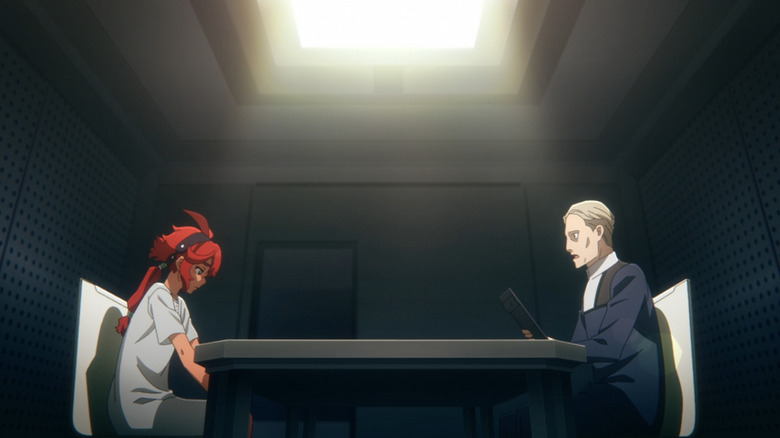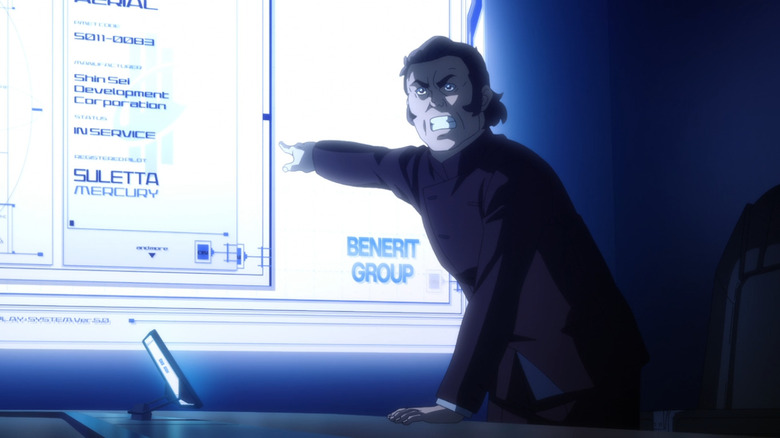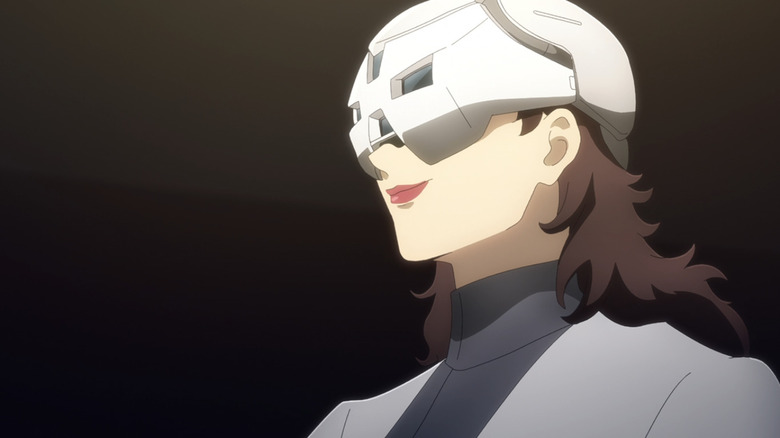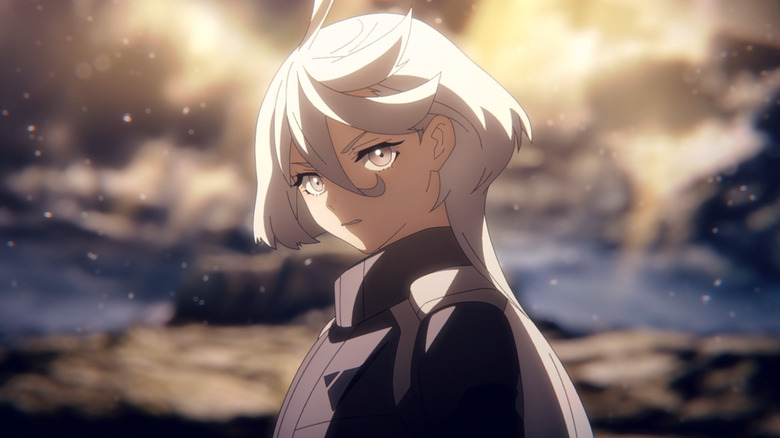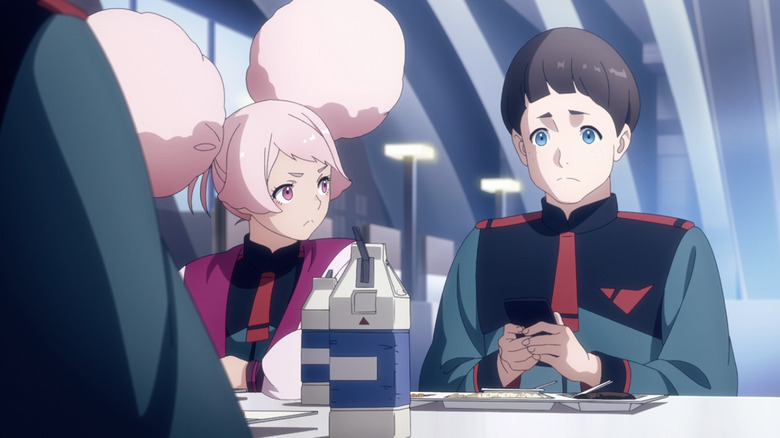The Witch From Mercury Goes To Jail, Does Not Pass Go In 'The Cursed Mobile Suit'
The second episode of "Mobile Suit Gundam: The Witch From Mercury" throws a spanner into the works. Did you think that our heroine Suletta would get in her powerful Gundam Aerial and lay waste to the rest of Asticassia School of Technology? Not so fast. A team of robots flies into the arena to arrest her, claiming that her mecha relies on forbidden GUND-based technology; a type of device that, as we learned in the prologue episode, strengthens itself by drawing directly upon human life force. Suletta is detained, the duel is annulled, and the status quo enforced by the powerful Beneritt Group remains intact. The only real fight scene in this episode is a short teaser after the ending credits. The remainder is all politics.
Then again, that is not such a bad thing. From the very beginning, "Mobile Suit Gundam" distinguished itself from its peers through politics. One of the most memorable characters in the original series was Char Aznable, a talented pilot who serves the villainous Republic of Zeon but plots behind the scenes to avenge himself upon its nobility. The Earth Federation, which backed the heroic Amuro and its crew, were themselves tainted by their willingness to send an army of children to do their dirty work. Here in "The Witch From Mercury," we are given a similarly volatile set-up with a corporate focus. If the first episode of the series established its "Utena" bona fides, the second proves that this is in fact a "Gundam" series with all the trimmings.
The Beneritt Group
We learn plenty about the Beneritt Group in this episode. A coalition of powerful corporations and arms manufacturers, they rule the solar system with an iron fist. Despite their strength, though, we've seen that the Group is already riddled with contradictions. Last episode, Guel's father Vim Jeturk plotted to assassinate the chairman, Delling, and seize control of the Group through his son's engagement to Delling's daughter Miorine. In this episode, Vim continues to maneuver behind the scenes, even working with his "enemies" to cause problems for Delling. Other members of the Group are more inclined to play matters by the book. Of particular interest is Sarius Zenelli, an older man who serves as a cautious voice of reason on the board. The Beneritt Group might be composed of cold-blooded and ruthless corporate masters, but the precise flavor of cold-bloodedness varies depending on the person.
The two biggest players here, of course, are Delling and his daughter Miorine. Delling is an autocrat who will purposefully break his own rules to crush challenges to his power. While the Beneritt Group preaches a doctrine of self-sufficiency and "only the strong will survive" rhetoric, it's clear that Delling believes that philosophy only so much as it keeps him in control. That very hypocrisy drives Miorine up a wall, inflicting upon her all the frustration that comes when a teenager catches their parent in a lie. When she demands to know if her father considers himself a king rather than a chairman, Delling simply answers, "yes." This isn't particularly subtle writing from scriptwriter Ichiro Okouchi, but then the capitalist world in which we live isn't particularly subtle either.
Prospera's bots
The most fascinating new arrival in this episode is Lady Prospera, representing the manufacturers of Suletta's Aerial machine. She claims that the Aerial is a conventional machine, not a Gundam. But the viewer knows not to believe her because she is wearing a mask, a staple of the aforementioned Char Aznable and his many lookalikes. Prospera is almost certainly working to destroy the Beneritt Group, and (based on the prologue) I would bet that she is Suletta's mother as well. While Delling shuts Prospera down right away, Miorine's intervention allows the more self-serving members of the Beneritt Group to turn the situation to their advantage. Their insistence upon using the Aerial as a means of testing their own machines lays a solid episodic foundation for future episodes. But it also demonstrates the fatal flaw of a coalition whose sole organizing principle is self-interest. Without a king to keep them in line, the nobility will eat each other.
Don't forget Lady Prospera's name, as well. Aside from being a riff on "Utena," it is becoming increasingly clear that "The Witch From Mercury" may be borrowing from William Shakespeare's "The Tempest." Prospera is Prospero, betrayed by her compatriots and exiled to a faraway land. Her tool of revenge is the Gundam Aerial, just a few letters away from the wind spirit Ariel bound to Prospero's service in the play. "The Tempest" ends with a happy marriage between Prospero's daughter Miranda and Ferdinand, the son of the King of Naples who assisted in Prospero's betrayal. It remains to be seen if we will see a Caliban later in the series, or if Asticassia student luminaries Guel, Elan, and Shaddiq are meant to correspond to characters in the play. Suletta and Miorine are almost certainly linked to Miranda and Ferdinand.
The next generation of Gundam
There are signs of danger present here. After a very well-put-together first episode, this second episode features many visual shortcuts clearly meant to ease the pain of the animators When Suletta cries in prison, we barely see her face. When she eats, we hear the sound of munching but very little proper character animation. These might seem like petty complaints, but small movements like these are crucial to build audience investment in the characters and their struggles. I'm certainly willing to believe the rumors at this point that the production of "The Witch From Mercury" is barely hanging on; my only hope is that the series successfully airs its first half before it bursts into flames.
Meanwhile, Ichiro Okouchi's script remains entertaining, touching on relevant real-world concerns (including a pandemic!) even if it does so with the subtlety of a brick to the face. Okouchi has worked on some real stinkers in the past, and even the best series he's contributed to has its share of off-kilter story decisions. I'm not yet willing to believe that "The Witch From Mercury" will escape scot-free in this regard, especially with the production problems behind the scenes complicating everything. At the same time, I have to admit that so far the show's aim to court a new generation of Gundam fans has been wildly successful. The internet is flooded with fan art depicting Suletta and Miorine together, and even noted anime fan Hideo Kojima is curious. With luck, this will be a "Gundam" series to remember.
This week's addendum
The Suletta and Miorine Power Hour: Suletta and Miorine spend much of this episode separated, but Miorine does travel to the Beneritt Group to give her father a piece of her mind and free Suletta from captivity. We also learn that Miorine had to give up piano as an heiress to the Beneritt Group. Perhaps in future episodes we will see her dramatically play the piano while Suletta destroys dozens of robots in her Gundam Aerial. One can dream, anyway.
The Robot Watch: In the stinger after today's ending credits, we see a very impressive red mecha dice its foes into many small pieces. Could this be Suletta's opponent in the next episode? We'll just have to see.
The Utena Corner: This week we meet the amazingly named Chuatury Panlunch, a student representative of Earth House with very large hair. I admire her resoluteness in condemning the discrimination of her peers, but most importantly of all, she's a clear Utena reference! Chuatury's hair and nickname Chu-Chu is a clear reference to Chu-Chu, Anthy's pet mouse who engages in all kinds of shenanigans throughout "Revolutionary Girl Utena." Will Chu-Chu will play a comic relief role in "The Witch of Mercury," or something more serious? Either way, i"m keeping an eye on her.
